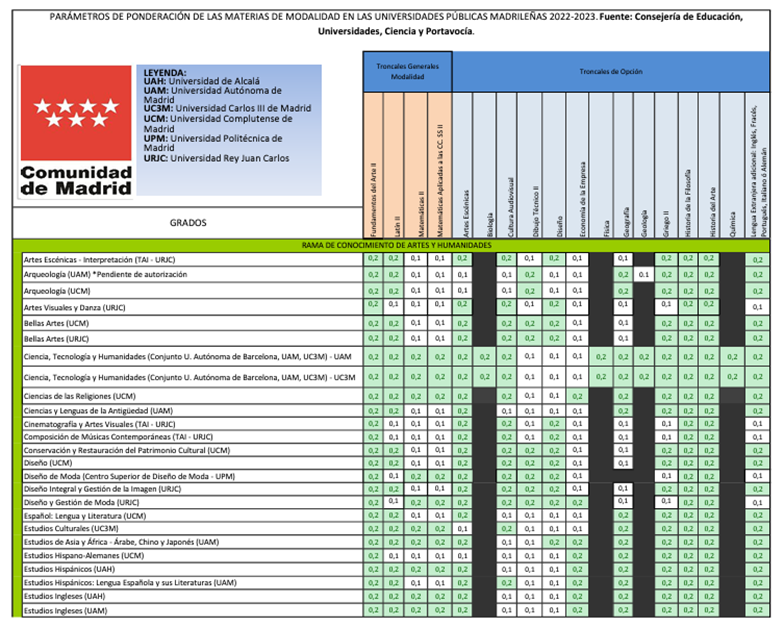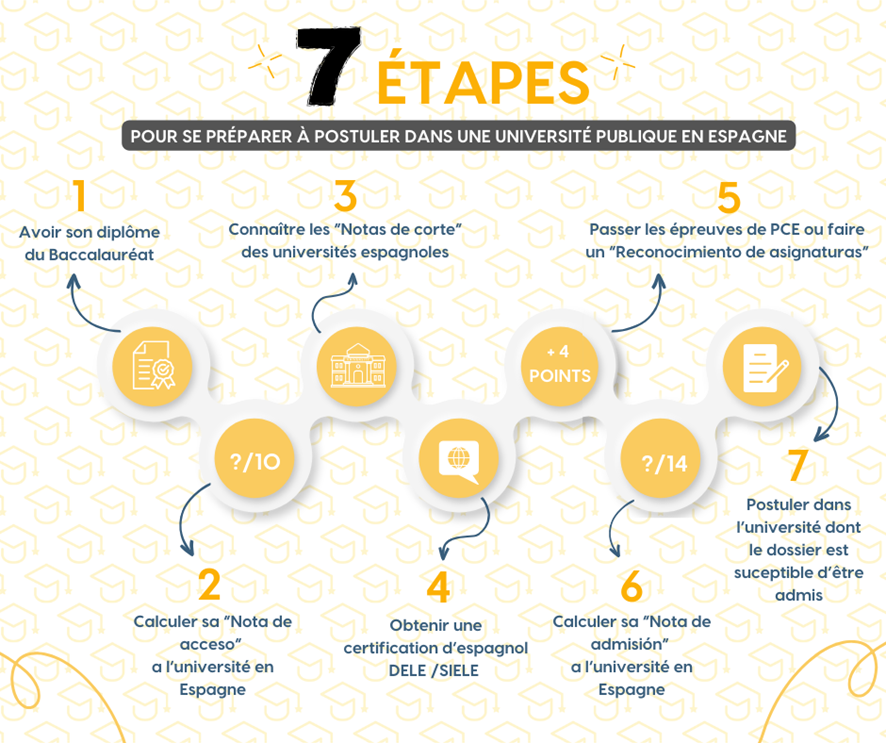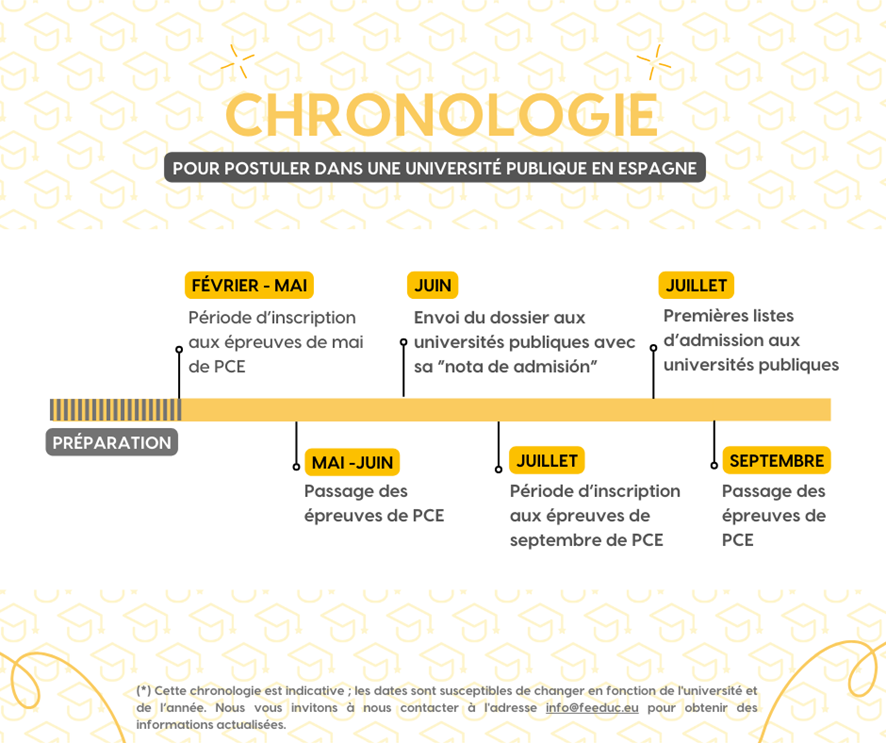The nota de corte: everything you need to know to assess your chances of admission to a public university in Spain
You've probably heard of Spain as one of the most popular destinations for higher education.
Indeed, Spain has become a popular destination for international students thanks to the quality of its higher education, the diversity of the programs on offer (business, physiotherapy, design, international relations, veterinary, journalism, architecture, engineering, dentistry, etc.) and the attractive lifestyle it offers.
Spain has become THE country of academic and cultural discoveries for all students eager to broaden their horizons.
Let's delve deeper into the Spanish university system, focusing on one of the essential criteria for access to public universities in Spain: "La nota de corte."
If you'd rather listen to this article than read it, check out our podcast dedicated to higher education in Spain.
For the rest of you, happy reading!
Understanding the Spanish University System
Spain's university landscape is made up of 84 higher education establishments, divided into 50 public and 34 private universities. Both categories of institution award official degrees recognized throughout Europe, including France, thanks to the Bologna agreements.
In Spain, the student selection process for public universities is very different from that of other education systems.
Unlike some countries where students have the power to choose the university they wish to attend, in Spain it is the public university itself which, mainly on the basis of an application file, will accept or reject a student's application.
Applicants may also be required to provide certification of their level of Spanish (DELE or SIELE certification) before being accepted by a university.
It is essential to understand that acceptance of an application by a university does not automatically guarantee admission. In order to finalize your enrolment, you must be among the top candidates.
Rest assured, we are now going to explore in detail the process of gaining access to a public university in Spain.
Preparing to study at a public university in Spain!
To begin a course of study at a public university in Spain, it's essential to know the essential information to access it, and it's worth noting that it can sometimes be difficult to gather all this information exhaustively and then understand it properly.
Information on admission criteria and deadlines can vary depending on the region, the university chosen within that region, the year and even the course you are planning to follow.
That's why it's imperative to have in-depth knowledge of the field and to keep a regular eye on changes in enrolment conditions when considering studying in Spain. Such expertise can make the difference between a successful application and a failed one.
Another point to bear in mind when preparing to study at Spain's public universities is the selection process itself.
Selection is based primarily on the student's academic record. To fully understand the selection process at Spanish public universities, you'll need to pay particular attention to what are known in Spain as the "nota de corte", the "nota de acceso" and the "nota de admisión". What is the difference between these different concepts?
Access to public universities in Spain is assessed through a well-defined system known as the "nota de corte".
What is the "nota de corte"?
The "nota de corte" is the grade set by each public university as a condition of access to each of their courses. It is the "nota de acceso" and the "nota de admisión" (which we will define later) that will determine whether you have the grade required to enter the university of your choice, based on the "nota de corte" established.
The "nota de corte" varies from year to year, depending on a number of factors: the public university chosen, the course of study you wish to pursue, the number of places available in the program, and the mark with which the last student admitted entered the course the previous year.
If a diploma is in high demand and there are more applicants than places available, the nota de corte can be very high. On the other hand, if the number of applicants is lower than the number of places available, the nota de corte may be lower.
The nota de corte is a 14-point score.
For example, it is worth noting that the Universidad Complutense de Madrid (UCM) currently holds the highest "nota de corte" in Spain for its double degree in Mathematics and Physics, amounting to 13.83 out of 14.
According to an article in "El Mundo", this significant increase could be attributed to the rise in demand from students wishing to access double degree programs in recent years.
What is the "note de acceso"?
The "nota de acceso" for a student from a different educational system to that of Spain, is obtained following the equivalence of the baccalaureate mark. In other words, the "Credencial".
A Spanish organization, UNED, is responsible for calculating your Credencial, which is graded out of 10 points (for a baccalauréat in the French education system, the bac mark is converted from a mark out of 20 to a mark out of 10).
The maximum "nota de acceso" that can be obtained is 10 points, and the minimum score with which you can apply for a place at university is 5 points.
What is the "nota de admisión"?
The "nota de admisión" is the one that will probably increase your chances of applying to your chosen public university in Spain.
The maximum admission grade a student can obtain is 14 points.
It is obtained after passing the PCE tests or completing a "Reconocimiento de asignaturas".
This is your "nota de acceso" + the points obtained in the PCE exams or the completion of a "Reconocimiento de asignaturas", taking into account the weightings (0.1 or 0.2) defined by the public university selected.
These weightings vary according to the university and specialization chosen.
Let's take a closer look at this point.
What is PCE and what is it for?
The PCE, or "Pruebas de Competencias Específicas" in Spanish, are specific aptitude tests that form part of the assessment for access to public universities in Spain.
They earn 4 additional points to be added to the score out of 10 obtained for the "nota de acceso".
The aim of the PCE is to ensure that candidates have the necessary skills to succeed in specific courses of study. The tests are in Spanish and based on a Spanish curriculum.
Up to 6 subjects can be taken in the PCE tests, but only the results of 2 of them will earn up to 4 additional points (2 points for each subject tested).
Each university in Spain can define specific subjects to be taken at the PCE exams, depending on the course the student wishes to follow. So if you're interested in studying at a particular public university, it's important to find out which subjects are specific to the course you want to follow. Please note that information on the subjects to be taken at the PCE may vary from year to year, as each university publishes weighting tables that are constantly updated.
Here is an example of a weighting table for Madrid's public universities in 2022-2023:
We strongly encourage you to prepare for these exams.
To this end, we suggest that you take a preparatory year, also known as the GAP Year in Spain, specially designed for access to studies at public universities.
For more information, please contact us at info@feeduc.eu.
What is "Reconocimiento de asignaturas" and what is it for?
Reconocimiento de asignaturas" is an alternative to PCE.
In order to obtain the 4 additional points to be added to the "nota de acceso" and thus obtain a 14-point "nota de admisión" at university, the "Reconocimiento de asignaturas" offers the possibility of avoiding additional tests, such as the PCE, by having certain subjects already validated at the baccalaureate examination recognized. The subjects recognized must be related to the university's weighting grid.
As with the PCE, this option allows you to obtain a maximum of 4 additional points to add to your "nota de acceso", giving you a 14-point "nota de admisión" at university.
Please note that this "Reconocimiento de asignaturas" procedure does not apply uniformly to all regions of Spain, and therefore to all universities. Universities are regional and, consequently, the validity of this procedure is subject to the decision of the competent regional authorities. It should be noted that this option has become less and less accepted in recent years.
Here's a summary of the steps you need to take to prepare for applying to a public university in Spain.
What are the deadlines for applying to a public university?
It's essential for any student wishing to enroll at university to understand the crucial importance of knowing the deadlines associated with enrollment procedures, especially at public universities.
But beware, universities can often have different timetables. So it's important to make sure you have the most up-to-date and accurate information for your application.
Here are the main deadlines to remember when applying to a public university in Spain (please note: the deadlines given are indicative; dates may change depending on the university and the year. Please contact us at info@feeduc.eu for up-to-date information).
Expert support for a successful project
When considering higher education in Spain, it's essential to seek advice and support from specialists in the field.
Why? Because it can make the difference between success and difficulty in the admission process. Because it can make the difference between success and difficulty in the admissions process.
Here's why calling on experts in higher education in Spain is a wise decision:
- Gaining peace of mind: The road to admission to a Spanish public university can be complicated and fraught with pitfalls. Calling on specialists allows you to delegate these complex tasks, giving you the peace of mind you need to successfully complete your project.
- Gain peace of mind: Thanks to their expertise, you benefit from reassuring support throughout the process. Their knowledge and experience will help you navigate a sometimes bewildering environment with complete peace of mind.
- Ensuring deadlines are met: Deadlines are crucial when it comes to applying to Spanish public universities. Specialists ensure that every step is completed on time, avoiding any delays that could jeopardize your admission. Trusting an expert means saving time.
- Ensuring compliance with procedures: The Spanish admissions system is rigorous and demanding. Our experts help you comply with all procedures and requirements, minimizing the risk of errors that could lead to your application being rejected.
- Maximize your chances of admission: Your specialized advisors will work closely with you to optimize your application and identify the programs and universities that best match your profile.
At the end of the day, admission to a public university in Spain depends mainly on how well you understand and apply. Calling on experts in higher education in Spain is a wise choice to maximize the chances of success of your project in Spain. You'll benefit not only from valuable expertise, but also from the peace of mind you need to tackle this crucial stage of your student life with complete confidence.
How can I benefit from FEEduc's support for public universities?
- It all starts with registration on the FEEduc website. Once you have registered (€90), a personal interview is organized. This is when we start assessing your project, in particular its feasibility for studying at a public university.
- Following this interview, if the option of a public university in Spain interests you and seems to correspond to your profile, we will ask you to send us your Première and Terminale marks, as well as your baccalauréat transcript, so that we can proceed with a preliminary study of your file. (Please note that we do not offer support for students who have not yet passed their baccalauréat, as is the case for students who contact us during their Terminale).
- If your results do not appear to qualify you for admission to at least one of the public universities we have selected in Spain for their quality in previous years, we will inform you of this and will not offer you our service. This will allow you to concentrate your efforts on other guidance options, and you will also have the option of continuing the process independently if you wish.
- If, from a mathematical point of view, you would have been able to access at least one of the public universities we have selected in Spain for their quality in previous years, we will present the specific service we offer and its budget to you at a further meeting. This interview will enable us to present you with a quote tailored to your situation.
- If we have confirmed that your profile is likely to be admitted to a public university in Spain, and that our support service is suitable for you, you can then subscribe.
What does FEEduc's support for public universities offer?
1. Detailed feasibility study
This evaluation will enable you to determine in detail which of the public universities we have selected are likely to accept you, and according to what criteria (certified level of Spanish, PCE exams, etc.). Thanks to this analysis, you'll save a considerable amount of time by precisely targeting the universities likely to admit you.
2. The Credencial for access to public universities (only for students with a baccalaureate from a European country).
The process of enrolling in a public university in Spain may require a specific Credencial application, designed to increase your "nota de acceso" and obtain a grade out of 14 points (thanks to enrolment and completion of the "PCE proofs" or completion of the "Reconocimiento de asignaturas". This is also when you need to prove your level of Spanish. This process is more complex than the basic Credencial application, which is sufficient for admission to a private university in Spain.
You have the choice of entrusting this delicate process to us or managing it yourself. However, if you decide to proceed independently with this Credencial application, you should be aware that we will not be able to intervene at a later date, as certain choices and options are irreversible once validated.
3. Apply to a public university in Spain
This is the third service FEEduc offers. We take care of submitting your applications to one or more universities of your choice. A fee will be charged for each university application. We will follow your file until you receive your admission decision. If you are accepted, you will then be required to finalize your enrolment at the selected university according to the conditions and deadlines indicated by the university.
Please note that you can only subscribe to this admission service if you have previously entrusted us with the processing of your Credencial application, as this is a prerequisite for the implementation of your admission requests.
The budget for this support varies according to the services you choose to subscribe to. An individual meeting will be arranged to discuss your specific needs and determine the budget based on the services most appropriate for you.
Each of these services can be selected independently, but some require you to subscribe to the previous service, as they depend on it.
We hope you have gained a better understanding of the procedures involved in applying to Spanish public universities.
We're here to support and guide you through the various stages of your project, and to help you with all the formalities.
Caroline Lopez,
Expert on higher education in Spain for FEEduc (formerly FrancEspagne Éducation)
Your questions about higher education at public universities in SpainFAQ (Frequently Asked Questions). answers from Caroline
As mentioned above, to gain access to public universities in Spain, you need to have passed your baccalauréat.
Students in their final year of high school in France obtain their baccalaureate in a timeframe that does not correspond to the time required to submit a complete application to a Spanish public university.
That's why we recommend a Gap Year to prepare for a year at a Spanish public university. Gap years will not only enable students to bring their Spanish up to standard and prepare for official Spanish certification, but also to prepare for the famous PCE exams. Find out more on our dedicated page.
The bachibac is a bilingual French-Spanish education program that enables students to follow a curriculum combining the French baccalauréat and Spanish "bachillerato" programs. The term "bachibac" is a contraction of "baccalauréat" and "bachillerato". However, the "Bachillerato" is not the Spanish "baccalauréat".
The Spanish baccalaureate is the "EBAU".
The bachibac offers students a unique option, but it does not eliminate the need to sit an exam to gain access to a public university in Spain, as is the case for all other students. Bachibac students have two choices for admission: they can apply with their bachillerato and take the "EBAU", or they can opt for the baccalaureate and take the PCE.
Find out more aboutaccess to public universities here.
As a general rule, it is advisable to have an official certificate of competence in Spanish, such as DELE or SIELE, at level B2.
In some cases, this may be a mandatory requirement (and your application could be rejected if you don't have it).
Find out how to get up to speed in Spanish here.
The question of whether it is possible to have higher education studies recognized in Spain cannot be answered with a simple "yes" or "no".
It depends on a number of factors, including: the student's previous field of study and where it was completed, the program of study he or she wishes to pursue in Spain, the Spanish region where he or she will study and the specific university he or she will choose for his or her studies.
It is generally necessary to have certain documents translated and to go through a pre-study by the university to assess which subjects could be validated in Spain.
Find out how to apply for ECTS equivalence here.
For international students entering their first year, it is often difficult to find financial aid to finance their studies at a university in Spain.
A number of factors can determine whether a student is eligible for aid: academic criteria (the student's academic record), social criteria (the student's family's income), high-level sportsmen and women. These grants are often awarded to Spanish students.
This makes it difficult to obtain financial aid or scholarships in Spain.
We invite you to read our blog article on this subject: How can I finance my studies in Spain?







